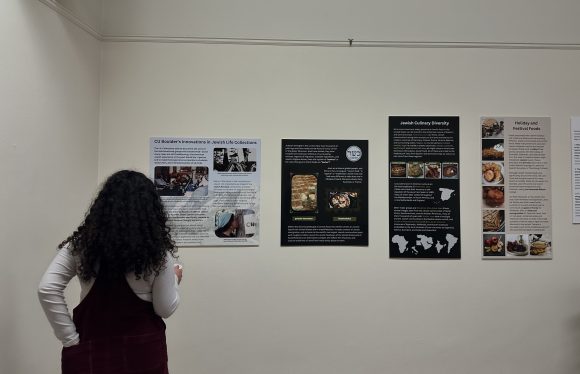
CU Boulder student viewing the Know Your Nosh: Food, Jewishness, & Identity exhibit in Norlin Library. (Lucy Adlen/CU Independent)
On the third floor of the University of Colorado Boulder’s Norlin Library is the Know Your Nosh: Food, Jewishness & Identity exhibit.
As part of the university’s Embodied Judaism Series, the exhibit explores the role of food and agriculture within Jewish cultural, national and political identities. It also uses food to delve into the connection between the United States, Israel and Palestine.
Know Your Nosh is centered around the Jewish communities in the United States, Israel and Palestine, regions with the largest concentrations of Jewish populations globally. It specifically focuses on the importance of Jewish Renewal, a spiritual movement with values such as gender equality and environmental awareness. Some of the papers within the collection come from one of the Renewal Movement leaders, Reb Zalman Schachter-Shalomi.
The exhibit analyzes the fusion and exchange of food in these regions’ sociopolitical dynamics. It also aims to foster discourse about the stereotypes surrounding Jewish foods and the erasure of unique traditions.
“In the United States, people tend to think of specific foods that are Jewish: bagels, gefilte fish, lox, kugel, etc. These foods are Ashkenazi: from Eastern Europe,” wrote Hilary Falb Kalisman and Samira Mehta, two directors within the university’s program in Jewish studies, in a joint statement to the CU Independent. “They don’t represent the diversity of Jewish life and experience in the United States. This can erase vibrant Jewish traditions and foodways, or make them seem less Jewish.”
Many of the emphasized archives focus on nourishing the human body in connection with nourishing the soul. Blessings, traditions and holidays that emphasize mindfulness were a focal point of this exhibit.
Earlier this year, the Program in Jewish Studies and the University Libraries Rare and Distinctive Collection hosted a symposium to introduce the exhibit and foster discussion on the role of food throughout the region.
“Two of the scholars we brought in for the Embodied Judaism symposium and public event, Professors [Ari] Ariel and [Ronald] Ranta, had somewhat opposing viewpoints on the history of Israeli food and how to address questions of cultural appropriation,” Kalisman and Mehta said. “That said, it was a very productive and rigorous scholarly event.”
Focusing on the integration of Jewish farmers within the region, the curators explored how religion and spiritual practices interact with agriculture. Additionally, the curation of this exhibit engaged the researchers in discussion of the history of Israeli food.
“It’s very easy to exchange or take up recipes from surrounding communities, and to claim them as either Jewish or not, leading to questions of cultural appropriation or even situations where various communities aren’t welcome but their foods are,” said Kalisman and Mehta.
The symposium also explored eco-Judaism, a movement to educate and promote sustainability within Jewish values. The exhibit highlights the factors of transitory periods for farming practices.
“One of our participants in the symposium, Adrienne Krone, has been studying farms long before this transition occurred,” said Kalisman and Mehta. “Her research considers some of the ways that those farms have shifted their focus increasingly in the direction of environmental justice and the climate crisis. What that looks like is different in different places. There’s an increased interest in veganism, and in not just thinking about animal cruelty but the environmental impacts of farming practices.”
For CU Boulder students, Kalisman and Mehta hope the exhibit will promote dialogue about where Jewish ethics and food intersect and broaden conversations about diversity and environmental awareness.
“I hope visitors think a bit more about the diversity of Jewish food and Jewish life and also the availability of so many materials in these collections,” Kalisman and Mehta said.
Know Your Nosh: Food, Jewishness, & Identity will be on display outside of the Rare and Distinctive Collections classroom in the Norlin Library until May 2024.
Contact CU Independent Special Issues Editor Lucy Adlen at lucy.adlen@colorado.edu
